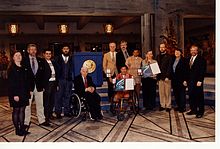
Back الحملة الدولية لمنع الألغام الأرضية Arabic الحملة الدولية لمنع الألغام الأرضية ARZ Міжнародны рух за забарону супрацьпяхотных мін Byelorussian Міжнародны рух за забарону супрацьпяхотных мінаў BE-X-OLD Международна кампания за забрана на противопехотните мини Bulgarian Campanya Internacional per a la Prohibició de les Mines Antipersones Catalan کەمپینی نێونەتەوەیی بۆ قەدەغەکردنی مین CKB Mezinárodní kampaň za zákaz nášlapných min Czech International Campaign to Ban Landmines German Διεθνής Εκστρατεία για την Απαγόρευση των Ναρκών Greek
This article needs additional citations for verification. (November 2024) |
 | |
| Abbreviation | ICBL |
|---|---|
| Formation | October 1992 |
| Founder | Jody Williams |
| Founded at | New York, United States |
| Type | NGO |
| Legal status | Nonprofit |
| Purpose | Working for a world free of antipersonnel landmines and cluster munitions |
| Headquarters | Geneva, Switzerland |
| Coordinates | 46°13′N 6°08′E / 46.22°N 6.14°E |
Region | Worldwide |
| Methods | Public awareness, publications and advocating at national, regional and international levels |
| Fields | Disarmament of anti-personnel mines |
| Website | www.icbl.org |

The International Campaign to Ban Landmines (ICBL) is a coalition of non-governmental organizations whose objective is a world free of anti-personnel mines and cluster munitions, where mine and cluster munitions survivors see their rights respected and can lead fulfilling lives.
The coalition was formed in 1992 when six organisations with similar interests (France-based Handicap International, Germany-based Medico International, UK-based Mines Advisory Group, and US-based Human Rights Watch, Physicians for Human Rights and Vietnam Veterans of America Foundation) agreed to cooperate on their common goal.[1] The campaign has since grown and spread to become a network with active members in some 100 countries—including groups working on women, children, veterans, religious groups, the environment, human rights, arms control, peace and development—working locally, nationally and internationally to eradicate antipersonnel landmines. A prominent supporter was Diana, Princess of Wales.
The organization and its founding coordinator, Jody Williams, jointly received the 1997 Nobel Peace Prize for their efforts to bring about the Mine Ban Treaty (Ottawa Treaty). The signature of this treaty (which bans the use, production, stockpiling, and transfer of anti-personnel mines) is seen as the campaign's greatest success. The prize was received on the organisation's behalf by its co-founder, Rae McGrath of the Mines Advisory Group and by Tunn Channareth, a Cambodian mine victim and ICBL activist.
The ICBL monitors the global mine and cluster munition situation (through Landmine and Cluster Munition Monitor, its research and monitoring arm), and conducts advocacy activities, lobbying for implementation and universalization of the Mine Ban Treaty, humanitarian mine action programs geared toward the needs of mine-affected communities, support for landmine survivors, their families and their communities, and a stop to the production, use and transfer of landmines, including by non-State armed groups. The ICBL participates in the periodical meetings of the Mine Ban Treaty process, urges states not parties to the treaty to join and non-state armed groups to respect the mine ban norm, condemns mine use and promotes public awareness and debate on the mine issue, organizing events and generating media attention.
- ^ "20 years in the life of a Nobel Peace Prizewinning campaign". ICBL website. Archived from the original on 13 November 2018. Retrieved 10 November 2018.
1992: (...) Six NGOs (HI, HRW, MI, MAG, PHR, and VVAF) meet in New York and agree to coordinate campaigning efforts